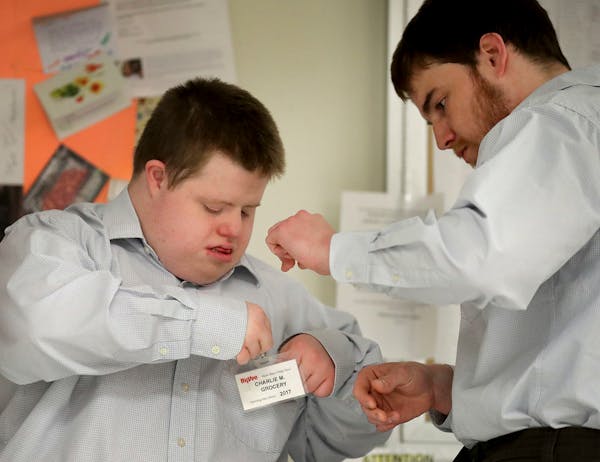Judy McIntire recalls feeling "frustrated and confused" when she learned in 2016 that a new federal law would require her son Chris, who has a cognitive disability, to pursue regular work in the community.
Chris already had a secure place in a day training and habilitation center, Options Inc. in Big Lake, where he had a tight circle of friends and worked on a job crew cleaning local buildings for a few dollars an hour.
"My son was happy and safe, and I didn't want him to lose any services," she said.
Nearly two years later, McIntire is decidedly more upbeat. Within weeks after an interview with a state job counselor, Chris was hired at the Friendly Buffalo Restaurant in Big Lake, where he washes dishes and prepares tables before the dinner rush each evening. He still attends the nearby day center five days a week, which provides transportation to his new job.
The good-natured 24-year-old has adapted quickly to the often frenetic pace of a restaurant kitchen, scrubbing and spraying dishes as cooks dart around him with plates of food. A state-funded job coach watches him from several feet away, but that's mostly to protect his safety: McIntire works with focused concentration and requires only occasional prompting. On a recent work shift, he rapped on the counter playfully with his knuckles and whistled along as Bob Dylan's "Like a Rolling Stone" blared from a nearby radio. Other workers joined him, creating a rousing chorus. "The days that Chris is here makes it fun for everyone," said T.J. Roberts, co-owner and manager of the restaurant.
As for his mother, she has changed her outlook on the federal law. "To see him smile at the end of the shift has made it all worthwhile," she said. Still, McIntire said she worries that, after nearly two years at the Friendly Buffalo, her son has yet to advance beyond the back of the kitchen, and rarely gets to meet customers.
"It's work," she said, "and it doesn't matter where you are, work can be very isolating.''
Spring's hot gift book features gorgeous found-nature photos
Victim in north Minneapolis shooting identified as man from Chicago

This St. Paul native now goes by Kandi Krush, and she body-slams her opponents in the ring

Baseball Metro Player of the Year packs up his five tools and leaves

